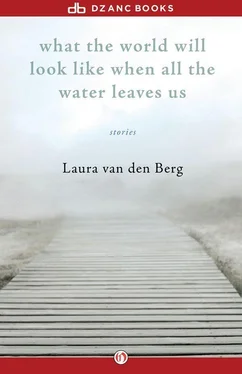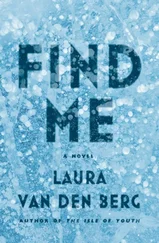“I have some packets in my room,” Daud said. I noticed he was still standing in the doorway, that he hadn’t gone to my mother.
While he was away, my mother became delirious. She said the lemurs were dead and the forests were burning, that a flood was going to sweep away the hotel and crocodiles would rule the island. The tops of her hands were beaded with sweat and I was almost afraid to touch her. I was relieved when Daud returned, carrying a canteen filled with a mixture of hot water and the ORS powder. He handed me the canteen and I kneeled on the bathroom floor and cupped the back of my mother’s head in my hand. She drank without protest.
We moved her to the bed and I took off her shoes. I was surprised by the narrowness of her feet, the little clusters of blue and purple veins bunched on her skin like constellations. I smoothed her hair and noticed gray roots coming in, as though someone had painted the peak of her head with ash.
Just as I was drawing my hand away, my mother wrapped her long fingers around my wrist. “This is why I need you here,” she said before turning from me and drifting off.
Daud and I went into the hallway and sat on the floor, next to each other, our backs against the wall. He gave me another ORS packet for the morning.
“I’m going back to Antananarivo,” he said.
I asked Daud what my mother had done. Things hadn’t ended well in South America when Alfonso saw her passport and discovered she’d shaved a decade off her age.
“Her theory is wrong,” he said. “That’s what we’ve been fighting about. Or that’s part of it, anyway. Lemurs don’t impact rainforest re-growth the way she thought. The deforested areas don’t do better or worse without the lemurs and their seed-burying. The trees still start regenerating.”
“Does she know she’s wrong?”
“Knowing and believing are two different things.”
“Maybe when she gets better, she’ll come around.”
“We both know that’s not going to happen.” Daud drummed his fingers against the scuffed floorboards. “Have you given any thought to getting out of here?”
“A little.” I knew those moments of closeness, when we talked in the rainforest and in her room, when I poured the hydration mix into her sick body, would be forgotten once she’d recovered and was back to acting like all those human concerns, even love, didn’t touch her.
“You could come back to Antananarivo with me. Stay in the city for a while, see if we can’t find you someone to train with.” Daud touched my elbow. His fingertips felt warm and smooth.
“I can’t leave my mother like this,” I told him.
Daud shrugged. “Would she stay for you?”
“I don’t know,” I said. “But I’m not her.”
He rested his head against the wall, his throat curved and muscular, and started humming. I wondered what it would feel like to be in the company of a man who didn’t know my mother, who saw me without the shadow of my origins. I would be free to offer a self I had selected and shaped, to pretend I knew nothing of science, that I’d never traveled beyond the New York state lines, that I only understood water and openness and quiet.
“You can’t hear the Indris as much from here,” I said. “If only I’d known that sooner. I might have slept in the hallway.”
“The lemurs have gotten used to people over the years, gotten lazy,” he said. “But some think they drove the first British colonists who attempted to settle the island mad.” He told me the Latin root of lemur meant ghost because of the way they blended noiselessly into the rainforest and darted from tree to tree so swiftly, they were nearly invisible. He’d read travel journals from British sailors that described being awakened at night by screams, but never finding the culprits, and entering forests with the sensation of being followed, but never knowing what was tracking them, if something was there at all.
“Hard to believe they were actually feared,” I said. “They just look like sad little monkeys now.” I recalled the way some of them clung to the trunks and branches, as though their homes might topple at any moment.
“I wanted to give you these before I left.” Daud took an envelope from his back pocket and handed it to me. “I shot them a few weeks ago.”
I opened the envelope and found two pictures inside: one of an Indri, the creature that had been tormenting me so, crouched in the crook of a tree, timid and pitiful under the glare of Daud’s camera. The other was of my mother kneeling on the rainforest floor, elbow-deep in black mud, as though she had hooked her fingers around a treasure and was dragging it to the surface.

Once my mother had fully recovered and Daud had been gone for a few days, I announced my plans to leave. I told her in the evening, while we had dinner on the patio. I had been swimming that afternoon — for the last time in those waters — and let myself bob in the sea like a buoy. My hair was still damp and smelled of brine.
“I’m tired,” I said. “I need to go someplace familiar.”
“You mean New York.”
“I mean home.”
“What will you do there?”
“Daud said your theory about the lemurs is wrong.” We’d had a special dinner of curried fish, and I stared at the fine white bones on my plate. “What if he’s right? Do you have other theories you could write about?”
“Important ideas are often discouraged by lesser people.” She picked at her fingernails, which were rimmed with red dirt. She had started going back into the field, but still looked pale and tired. “You didn’t answer my question.”
“I’m going to swim,” I said. “I’m going to find a trainer and practice and become great.”
“You won’t make it far, Celia.” My mother straightened her sunglasses. “You don’t have it in you.”
“You have no idea what I have.”
“Strangeness is everywhere and everything makes you tired in the end,” she said. “When you figure this out, you’ll be back.”

I asked the hotel owner to arrange a taxi for the morning and then packed my bags. In my room, I counted my money, making sure I had enough for a car and a plane ticket. I planned to show up and wait until I could get a flight to the States, eventually ending up back in New York, where I would look for a job and an apartment near the Atlantic. I couldn’t imagine ever making my way through the lanes of a swimming pool again; I had grown used to the expanse of the ocean, the sensation that I could, at any moment, vanish within it.
When I came out of my room the next day, I found one of my mother’s postcards by the door. A desert was on the front and on the back she had written: what the world will look like when all the water leaves us , along with some statistics on the evaporation of the Aral Sea, formerly the world’s fourth largest lake and once a popular training ground for distance swimmers. I tucked the card into the side pocket of my backpack, next to Daud’s pictures. I did not know what my mother would do after Madagascar — travel to another foreign place and join a different research team or extend her stay in Fort Dauphin, though I was sure she wouldn’t return to New York. She reminded me of a skydiver who’d cut the strings of her own parachute, volatile and doomed.
The taxi was waiting for me outside. The driver was a small man with a white beard. The top of his head barely reached the headrest. I was climbing into the backseat when I saw, in the far distance, a figure moving towards the rainforest. I asked the driver to wait and followed my mother down the road. I wanted a chance to say goodbye, to say the things we might not ever be able to say again. I stayed just close enough to keep her in sight. The sprawl of trees ahead looked bright and endless, an ocean of green. She had to know I was there, had to hear my feet tapping the red dirt, but she never turned around, never spoke a word.
Читать дальше














